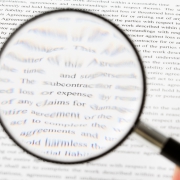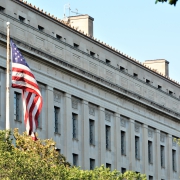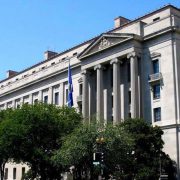Wi-Fi Negative Letters of Assurance Contaminate and Compromise ISO 8802 Standards

Is this what awaits?
Last year, I described the broad negative and anticompetitive consequences of the IEEE’s 2015 patent policy, and was pleased to see the U.S. Department of Justice’s important 2020 Business Review Letter to IEEE (“DOJ BRL”) cite to my empirical work (see FN 47). As a reminder, documented consequences include delay and chaos in development of Wi-Fi standard amendments; loss of ANSI accreditation; delays in disclosure of licensing intentions; an unprecedented uptick in negative RAND assurances, and more.

Text in page 9 of the DOJ BRL summarizes these effects as follows:
“Since the Policy went into effect, reports show that negative assurances—those in which a technology contributor declines to give a RAND assurance—have increased significantly, comprising 77% of the total WiFi Letters of Assurance at IEEE between January 2016 and June 2019. As a result, in 2019, the American National Standards Institute—a leading nongovernmental body that accredits US standards—declined to approve two proposed IEEE standards amending the 802.11 WiFi standard. The Policy also appears to have led to delays in disclosures of licensing intentions, reducing the overall clarity of patents potentially relevant to standards under development.”
In addition to these well documented effects, I was intrigued to recently learn of a new significant effect of which I was not aware to date, this time outside the U.S.
Because IEEE is not an international standards development organization (“SDO”), for decades it has been partnering with the Geneva-based International Organization for Standards (ISO), most recently through a formal cooperation agreement. Such formal cooperation allows IEEE to “fast-track” some of its standards through ISO (which is an international SDO), thereby automatically giving certain IEEE standards, e.g. Wi-Fi (IEEE 802.11), an international (ISO 8802) standard name and “imprimatur.” This arrangement gives fast-tracked IEEE standards much-needed international recognition and status that are important in most countries around the world.
So far – so good. However, ISO’s procedures, like those of every SDO I know except for IEEE, mandate that ISO standards cannot be published until positive patent statements (“Letters of Assurance” or “LOAs” in IEEE lingo) have been secured for them. This is a basic principle in open standardization that is also required under ANSI’s accreditation rules, and is most likely why ANSI rejected American National Standard designation for two Wi-Fi amendments last year.
As noted by DOJ, between January 2016 and June 2019, 77% percent of the LOAs for Wi-Fi have been negative LOAs/patent statements, i.e., statements in which submitters explicitly declined to give RAND assurances under the 2015 IEEE patent policy. This is an unprecedented reality that was very rare at IEEE until 2015, and continues to be very rare in all other SDOs. While Wi-Fi amendments have continued to trickle through ISO for fast-tracking, it appears as if the IEEE folks forgot to tell ISO about the growing negative LOA problem in IEEE standards, especially in Wi-Fi.
As a result, some of these negative LOAs have gone undetected while ISO, then unaware of the problem, fast-tracked standards such as 802.11ah and 802.11ai into ISO 8802 standards (see here) for which there are multiple negative LOAs (the problem which led ANSI to reject their accreditation). It appears, however, that these “ignorance is bliss” days are over. I hear ISO is now well aware of this unfortunate situation. It would be interesting to see how it goes about curing the problem – an immediate suspension of tainted 8802 international standards’ status for which there are negative IEEE LOAs until this is resolved seems like a necessary first step, along with a halt on fast-tracking future IEEE 802.11 standards for which there are negative declarations on file.
Moving forward, perhaps IEEE could look to find a path to solve the numerous negative LOA situation. After all, didn’t the 2020 DOJ BRL “encourage IEEE to consider [it] and all applicable facts when assessing whether an update to the [2015] Policy is warranted”? Anyone who cares about the quality of standards (IEEE or international ones) and the health and robustness of the open standardization system as well as the benefits they confer, would opt for voiding the IEEE 2015 patent policy and resetting to the openly and legitimately developed preceding IEEE patent policy. Notably, that prior patent policy was, and continues to be, cleared through a 2007 DOJ BRL who continues to stand of firm ground, and was not “supplemented” by follow-up strong-language BRL like the 2015 BRL was.
The path taken would probably depend on whether the decisionmakers will have IEEE’s best interests and standards quality in mind or, rather, whether the decision will be driven by an Apple consultant who shamelessly promises to help his clients “take control of the standards that drive their business”. The latter route has compromised IEEE standards (especially Wi-Fi) in recent years, cost it millions of $$$ in legal fees, tarnished its reputation, and is now threatening the international status of Wi-Fi standard amendments. It would be interesting to see how this plays out this time around.











